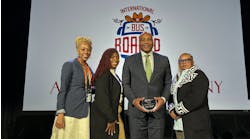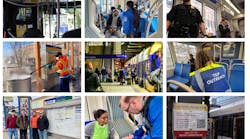The St. Clair County Transit District (SCCTD) and Chestnut Health Systems partnership aims to establish a longer-term solution handling situations, including all-day riders, panhandling and disruptive behavior.
Trains and transfer stations saw many people facing some combination of homelessness and mental health or substance use disorders.
The partnership began in spring 2021 and, six months later, expanded to include St. Louis Metro Transit.
Four, two-person teams from Chestnut work 40 hours per week in each district. The project aims to:
- Reduce loitering by "all-day" riders
- Address alcohol and drug use on the transit system
- Reduce panhandling, argumentativeness, sleeping and other disruptive behaviors
- Provide early detection and intervention for riders who need services
- Improve visibility of Metro Transit safety, security and rider satisfaction initiatives
- Improve communication between riders and security staff
- Improve the overall rider experience
Project staff members easily build rapport with riders, as the outreach specialists themselves are in recovery from substance use and/or mental health conditions. Some were hired for their roles after having served prison time. Nearly all will tell you they gravitated toward this role as a way of paying forward the help they got when they were ready to accept it.
Metro Transit security personnel learned through Mental Health First Aid training how to de-escalate situations and work with riders in a trauma-informed way.
The teams provide everything from water and healthy snacks to fentanyl testing strips and Narcan®. They give backpacks filled with essentials to riders experiencing homelessness. They use a mobile app to log rider interactions and to find out which agencies can offer immediate help. Team members facilitate warm hand-offs to agencies providing housing, food, primary and behavioral health care, medication, transportation to service providers and employment opportunities.
In its first two years, the SCCTD team logged nearly 2,600 engagement attempts, connecting 177 riders to services. The MetroLink team attempted more than 3,400 engagements in the project's first year, connecting more than 900 riders to services.






